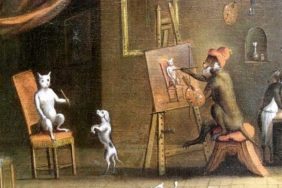Photo: Bikini, Moscow, 1959. © William Klein (detail). Courtesy Thames & Hudson.
“My photographs are the fragments of a shapeless cry that tries to say who knows what… What would please me most is to make photographs as incomprehensible as life,” photographer and filmmaker William Klein has said.
Also: But Is It Art? Marcel Duchamp and the Fountain Scandal

Born in New York in 1928, Klein has risen to global heights as one of the pre-eminent fashion and documentary photographers of the twentieth century. Now, on the cusp of his 90th birthday, Thames & Hudson introduces William Klein, the pocket-sized monograph from their elegant “Photofile” series. At $15.95, the book is the perfect starter to the wonderful world of William Klein, a powerful and profound vision of life all his own.
After joining the U.S. Army and getting stationed in Germany, then later France, Klein settled in Paris, enrolling at the Sorbonne in 1978 and studying with painter Fernand Léger. He had a couple of exhibitions in Milan, including one of kinetic art, which was attended by Alexander Liberman, the revered art director for Vogue.

Brazilian fans at the World Cup, Turin, 1990. © William Klein. Courtesy Thames & Hudson.
Despite having no formal training, Klein began working for Vogue as a fashion photographer and contributing photo essays documenting various cities around the world. In 1957, he won the prestigious Prix Nadar for his monograph, New York, which featured work made in 1954.
Klein was a rebel and a renegade, crafting his own path through photography doing that which pleased his sensibilities. He embraced the wide-angle and telephoto lenses, motion blur, and natural lighting. He easily took to the streets to document life on its thoroughfares, finding the nature of humanity best laid bare in the anonymity of urban life. His style reflected his subject: busy, gritty, chaotic bliss.

Bodybuilder, Tokyo, 1961. © William Klein. Courtesy of Thames & Hudson.
Klein has revealed, “I didn’t relate to European photography. It was too poetic and anecdotal for me… The kinetic quality of New York, the kids, dirt, madness—I tried to find a photographic style that would come close to it. So I would be grainy and contrasted and black. I’d crop, blur, play with the negatives. I didn’t see clean technique being right for New York. I could imagine my pictures lying in the gutter like the New York Daily News.”
Hardly likely for a man who was immediately embraced by both the commercial and fine art sides of the industry—but it is that attitude that kept Klein on the edge, always pushing the boundaries beyond that which the status quo embraced. “I always wanted to do something vulgar,” Klein has said, suggesting more of the traditional definition of the word: populist. That which is common and of the every wo/man does not hold to bourgeois appearances or respectability politics; rather is espouses the raw, primal roar of life as it truly is.
With Klein’s photographs we delve deep into the flesh, inside the body and into the spirit, where the soul is manifest. We see—but more importantly, we feel. We experience art without taboos, without civility, or order—and in that maddening cacophony of riotous light and shadow, Klein reveals its peace, joy, pleasure, and beauty.

Bikini, Moscow, 1959. © William Klein. Courtesy Thames & Hudson.
Miss Rosen is a journalist covering art, photography, culture, and books. Her byline has appeared in L’Uomo Vogue, Vogue Online, Whitewall, The Undefeated, Dazed Digital, Jocks and Nerds, and L’Oeil de la Photographie. Follow her on Twitter @Miss_Rosen.







